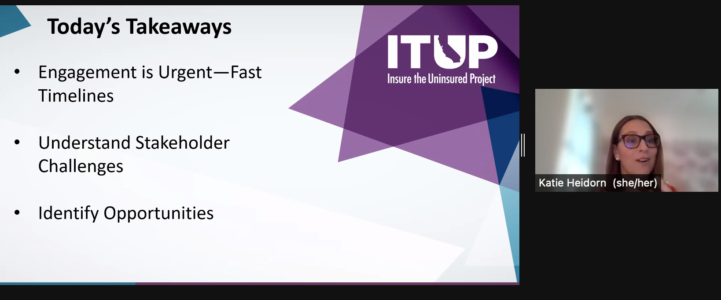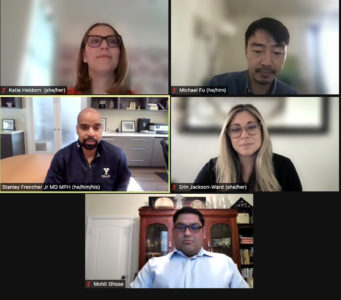On November 12, Connecting for Better Health organized a major policy briefing for stakeholders, policymakers, state agency staff, and members of the media, on the topic of “Advancing Data Exchange Across California.” The full video of the event can be found here.
The expert panel featured:
- Stanley Frencher Jr., MD, MPH, Associate Professor at UCLA Urology, Medical Director of Surgical Quality and Outcomes at MLK Jr. Community Hospital
- Michael Fu, MD, MBA, National Director of Behavioral Health at Hazel Health Inc.
- Mohit Ghose, Senior Director of Government Relations at Anthem Inc.
- Katie Heidorn, MPA, Executive Director at Insure the Uninsured Project.
- Erin Jackson-Ward, MPH, Director of the Community Benefit Giving Office at Cedars-Sinai
To begin, moderator Katie Heidorn gave a high-level overview of health information exchange––from the various types of HIE models, to key terminology, to the history of HIE in California, to the current situation in which California finds itself: a stakeholder engagement process that will chart the path forward for data exchange in the Golden State. She wrapped up her introduction with a review of the major takeaways, emphasizing that as the stakeholder advisory group process has already begun, we are already in a sprint to building the future of HIE in California:

To begin the discussion, Heidorn asked the panelists to answer a fundamental question: Why does health information exchange matter to you and your organization? Dr. Frencher responded first, from the provider’s perspective, noting that “When a patient shows up to the ER on whom I’ve performed a procedure, that ER doctor has no idea unless they have the information at their fingertips.”
Mohit Ghose, speaking from the payer’s perspective, said, “If you have the right information…then the care being provided at every level within the system will be better. If you look at this in the lens of equity, cultural competency…in order to make it work, you need to have the data at your fingertips.”
Next, Heidorn asked the panelists to reflect on a key question the stakeholder advisory group has been weighing: what are the primary use cases for HIE in California? And if the panelists had to choose one, which would they choose?
Ghose said, “The Medi-Cal system for behavioral health in California is bifurcated. The information lives within counties, or health plans, or both––but it’s different sets of information. You need a better level of connectivity. With the level of technological advances we’ve made, I’m still hopeful that data––which is highly protected––can flow between providers, payers, and others.”
Erin Jackson-Ward emphasized the importance of not trying to do everything at once, “starting small in one focus and building out from there.” This, as she noted, could help build the “playbook” by which the state can scale up health information exchange statewide.
By the same token, Ghose pointed out that “You’ve got to define a system that actually works, before you start adding to it. There are some established HIEs in California. Build the core, and expand as more providers, or CBOs even, become more familiar with the data exchange concept.”
Finally, Dr. Frencher noted that “Healthcare is still local. The success of regionalizing some of the approaches and digging deep in one area is a way to build the playbook that everyone’s talking about.”
Speakers provided key insights on how the state can get the ball rolling through the CalHHS Stakeholder Advisory Group. Among them:
- Start small and expand. Don’t try and scale up the system all at once
- Take advantage of a wide range of resources from multiple levels and sources that are on the table
- Build off of the successful programs and initiatives that already exist, rather than starting from scratch.
- Listen to stakeholders on the ground to understand the barriers they are facing.


